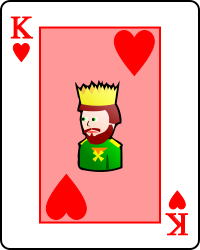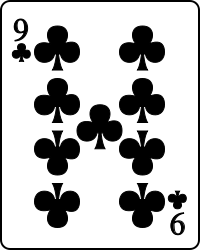- Playing cards:




- Properties of a
playing card:
- Each playing card
has a suit
- Spade, Heart, Club or Diamond
- Each playing card
has a rank
- A, 2, 3, ..., Q. K, A
The Ace has 2 ranks, depending on the game played and how it is used in a hand....
- Each playing card
has a suit
- Note:
- We will not
use a Joker in our
playing card
We will play poker with our deck of cards and this games does not use Jokers
- We can easily add a Joker card with a special value (like 99) and add the card to the deck.
- We will not
use a Joker in our
playing card
- We first need a
code to
represent
the suit and
rank of
a playing card
- Code for
the suit of a
playing card:
- 1 = Diamond
- 2 = Club
- 3 = Heart
- 4 = Spade
(I choose this code, because in most games, Spade ranks higher than Heart, Heart ranks higher than Club, and Club ranks higher than Diamond
- Code for
the rank of a
playing card:
- 2 = 2
- 3 = 3
- 4 = 4
- ...
- 10 = 10
- 11 = J
- 12 = Q
- 13 = K
- 14 = A
- (Initial) Data structure used to
represent a (one)
playing card:
public class Card { private byte cardSuit; private byte cardRank; }
- Examples:
- cardSuit = 1 and
cardRank = 4

- cardSuit = 3 and
cardRank = 13

- cardSuit = 2 and
cardRank = 9

- cardSuit = 4 and
cardRank = 14

- cardSuit = 1 and
cardRank = 4
- We can add the following
card suit and
card value
encoding information
inside the
Card class
to help with decoding
the card suit and
card rank:
public class Card { private static final String[] Suit = { "*", "d", "c", "h", "s"}; private static final String[] Rank = { "*", "*", "2", "3", "4", "5", "6", "7", "8", "9", "10", "J", "Q", "K", "A"}; private byte cardSuit; private byte cardRank; }
- How to use
the information in the
arrays Suit[] and
Rank[]:
Suit[0] is not used ("*" means error) Suit[1] contains the string "d" (for Diamond) Suit[2] contains the string "c" (for Club) Suit[3] contains the string "h" (for Heart) Suit[4] contains the string "s" (for Spade)
Rank[2] contains the string "2" ... Rank[10] contains the string "10" Rank[11] contains the string "J" Rank[12] contains the string "Q" Rank[13] contains the string "K" Rank[14] contains the string "A"So:
Suit[ cardSuit ] gives us the suit information of the card Rank[ cardRank ] gives us the rank information of the card
- Examples:
- cardSuit = 1 and
cardRank = 4
Suit[1] = "d" and Rank[4] = "4"

- cardSuit = 3 and
cardRank = 13
Suit[3] = "h" and Rank[13] = "K"

- cardSuit = 2 and
cardRank = 9
Suit[2] = "c" and Rank[9] = "9"

- cardSuit = 4 and
cardRank = 14
Suit[4] = "s" and Rank[14] = "A"

- cardSuit = 1 and
cardRank = 4
- Further
information encoding:
- We can improve
the readability by
defining some
symbolic constants
that describe the
suit information:
public class Card { public static final int SPADE = 4; public static final int HEART = 3; public static final int CLUB = 2; public static final int DIAMOND = 1; private static final String[] Suit = { "*", "d", "c", "h", "s"}; private static final String[] Rank = { "*", "*", "2", "3", "4", "5", "6", "7", "8", "9", "10", "J", "Q", "K", "A"}; private byte cardSuit; private byte cardRank; }With these symblic constants, we don't have to remember the facts that: 4 = Spade, 3 = Heart, and so on...
- We can improve
the readability by
defining some
symbolic constants
that describe the
suit information:
- Rules of thumb:
- Always define
a constructor method
- Define only constructor methods that make sense (i.e., that somebody will actually use)
- Always define
a constructor method
- Purpose of constructor methods
- Create a playing card
Information necessary to create a playing card:
- The suit of the card
- The rank of the crad
A useful constructor:
public Card ( int suit, int rank ) { initial the instance variables "cardSuit" and "cardRank" to represent this play card. }
- Is the default constructor
useful ?
- Is there a special card in the
deck that you would want to create
by default ?
-
Not likely
So: omit it...
- Is there a special card in the
deck that you would want to create
by default ?
- Is the copy constructor
useful ?
- Would you want to
copy an existing card
(in a deck of card) ?
-
Not likely, because each card is
uniuqe
So: omit it...
- Would you want to
copy an existing card
(in a deck of card) ?
- Constructor Method for the
Card class:
public class Card { public static final int SPADE = 4; public static final int HEART = 3; public static final int CLUB = 2; public static final int DIAMOND = 1; private static final String[] Suit = { "*", "d", "c", "h", "s"}; private static final String[] Rank = { "*", "*", "2", "3", "4", "5", "6", "7", "8", "9", "10", "J", "Q", "K", "A"}; private byte cardSuit; private byte cardRank; /* ---------------------------------------------------------------- Constructor Example usage: Card x = new Card( Card.SPADE, 1 ); // Ace of Spade Card x = new Card( Card.HEART, 11 ); // Jack of Heart --------------------------------------------------------------- */ public Card( int suit, int rank ) { if ( rank == 1 (Ace) ) cardRank = 14; // Give Ace the rank 14 else cardRank = (byte) rank; cardSuit = (byte) suit; } }
- Examine the
Card class
carefully:
public class Card { public static final int SPADE = 4; public static final int HEART = 3; public static final int CLUB = 2; public static final int DIAMOND = 1; private static final String[] Suit = { "*", "d", "c", "h", "s"}; private static final String[] Rank = { "*", "*", "2", "3", "4", "5", "6", "7", "8", "9", "10", "J", "Q", "K", "A"}; private byte cardSuit; private byte cardRank; /* ---------------------------------------------------------------- Constructor Example usage: Card x = new Card( Card.SPADE, 1 ); // Ace of Spade Card x = new Card( Card.HEART, 11 ); // Jack of Heart --------------------------------------------------------------- */ public Card( int suit, int rank ) { if ( rank == 1 (Ace) ) cardRank = 14; // Give Ace the rank 14 else cardRank = (byte) rank; cardSuit = (byte) suit; } }
- Remember that
the private variables (methods)
are inaccessible by
program statements
located outside
the Card class
So to your program, the Card class looks like THIS:
public class Card { public Card( int suit, int rank ) { if ( rank == 1 (Ace) ) cardRank = 14; // Give Ace the rank 14 else cardRank = (byte) rank; cardSuit = (byte) suit; } }
- In other words:
- With the definition of the
Card class that
we have written so far,
a Java program can
only create a Card object
- A Java program cannot do any other operations on a Card object !!!
- With the definition of the
Card class that
we have written so far,
a Java program can
only create a Card object
- What can you
do with a Computer Simulated
Playing card
- Not these tricks:


- Not these tricks:
- A Computer Simulated
Playing card is
not physical...
You can only do these operations to them:
- Read some of the
information that
has been stored away
- Update (write) some of the information that has been stored away
- Read some of the
information that
has been stored away
- Operations on Computer Simulated Object are implemented as methods
- Operations:
- Get the
suit of a
playing card as a number
(for computational purposes)
- Get the
suit of a
playing card as a String
(for printing purposes)
- Get the
rank of a
playing card as a number
(for computational purposes)
- Get the rank of a playing card as a String (for printing purposes)
- Get the
suit of a
playing card as a number
(for computational purposes)
- Note:
- We do not need
to change the
suit or the
rank of a
playing card
So.... we do not need to implement any update operations
- We do not need
to change the
suit or the
rank of a
playing card
- The suit() and
the rank()
methods for the
Playing Card:
public class Card { public static final int SPADE = 4; public static final int HEART = 3; public static final int CLUB = 2; public static final int DIAMOND = 1; private static final String[] Suit = { "*", "d", "c", "h", "s"}; private static final String[] Rank = { "*", "*", "2", "3", "4", "5", "6", "7", "8", "9", "10", "J", "Q", "K", "A"}; private byte cardSuit; private byte cardRank; /* ---------------------------------------------------------------- Constructor Example usage: Card x = new Card( Card.SPADE, 1 ); // Ace of Spade Card x = new Card( Card.HEART, 11 ); // Jack of Heart --------------------------------------------------------------- */ public Card( int suit, int rank ) { if ( rank == 1 (Ace) ) cardRank = 14; // Give Ace the rank 14 else cardRank = (byte) rank; cardSuit = (byte) suit; } public int suit() { return ( cardSuit ); // This is a shorthand for: // this.cardSuit } public String suitStr() { return( Suit[ cardSuit ] ); // This is a shorthand for: // this.Suit[ this.cardSuit ] } public int rank() { return ( cardRank ); } public String rankStr() { return ( Rank[ cardRank ] ); } }
- Programming advice:
- Always include the
toString() method
in a class
This will allow the Java Program to print the object variable in a format that is taylored for that object
- Always include the
toString() method
in a class
- Printing a Playing card
- We will print a playing card as
- Rank+Suit
Example:
- 5s = 5 of spade
- 4h = 4 of heart
- Kd = K of diamond
- Qc = Q of club
- We will print a playing card as
- The toString() method:
public class Card { public static final int SPADE = 4; public static final int HEART = 3; public static final int CLUB = 2; public static final int DIAMOND = 1; private static final String[] Suit = { "*", "d", "c", "h", "s"}; private static final String[] Rank = { "*", "*", "2", "3", "4", "5", "6", "7", "8", "9", "10", "J", "Q", "K", "A"}; private byte cardSuit; private byte cardRank; public Card( int suit, int rank ) { if ( rank == 1 ) cardRank = 14; // Give Ace the rank 14 else cardRank = (byte) rank; cardSuit = (byte) suit; } ..... (some methods omitted for brevity)..... public String toString() { return ( Rank[ cardRank ] + Suit[ cardSuit ] ); } }
- This is the final version of
the Card class:
public class Card { public static final int SPADE = 4; public static final int HEART = 3; public static final int CLUB = 2; public static final int DIAMOND = 1; private static final String[] Suit = { "*", "d", "c", "h", "s"}; private static final String[] Rank = { "*", "*", "2", "3", "4", "5", "6", "7", "8", "9", "10", "J", "Q", "K", "A"}; private byte cardSuit; private byte cardRank; public Card( int suit, int rank ) { if ( rank == 1 ) cardRank = 14; // Give Ace the rank 14 else cardRank = (byte) rank; cardSuit = (byte) suit; } public int suit() { return ( cardSuit ); // This is a shorthand for: // this.cardSuit } public String suitStr() { return( Suit[ cardSuit ] ); // This is a shorthand for: // this.Suit[ this.cardSuit ] } public int rank() { return ( cardRank ); } public String rankStr() { return ( Rank[ cardRank ] ); } public String toString() { return ( Rank[ cardRank ] + Suit[ cardSuit ] ); } }
- Next, we will discuss how to use the Card class to create card objects